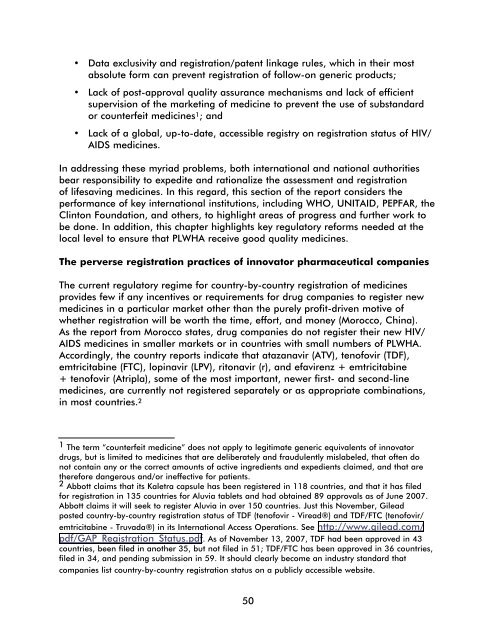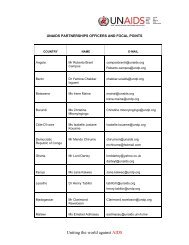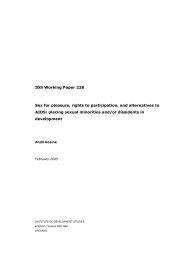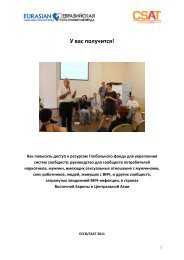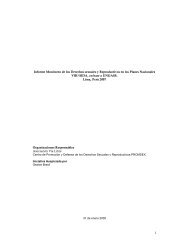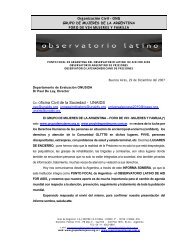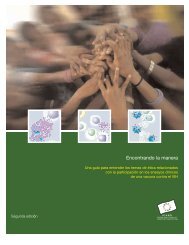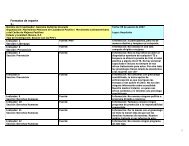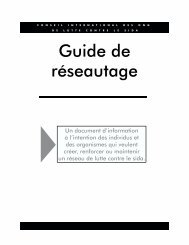Missing the Target #5: Improving AIDS Drug Access ... - CD8 T cells
Missing the Target #5: Improving AIDS Drug Access ... - CD8 T cells
Missing the Target #5: Improving AIDS Drug Access ... - CD8 T cells
You also want an ePaper? Increase the reach of your titles
YUMPU automatically turns print PDFs into web optimized ePapers that Google loves.
• Data exclusivity and registration/patent linkage rules, which in <strong>the</strong>ir mostabsolute form can prevent registration of follow-on generic products;• Lack of post-approval quality assurance mechanisms and lack of efficientsupervision of <strong>the</strong> marketing of medicine to prevent <strong>the</strong> use of substandardor counterfeit medicines 1 ; and• Lack of a global, up-to-date, accessible registry on registration status of HIV/<strong>AIDS</strong> medicines.In addressing <strong>the</strong>se myriad problems, both international and national authoritiesbear responsibility to expedite and rationalize <strong>the</strong> assessment and registrationof lifesaving medicines. In this regard, this section of <strong>the</strong> report considers <strong>the</strong>performance of key international institutions, including WHO, UNITAID, PEPFAR, <strong>the</strong>Clinton Foundation, and o<strong>the</strong>rs, to highlight areas of progress and fur<strong>the</strong>r work tobe done. In addition, this chapter highlights key regulatory reforms needed at <strong>the</strong>local level to ensure that PLWHA receive good quality medicines.The perverse registration practices of innovator pharmaceutical companiesThe current regulatory regime for country-by-country registration of medicinesprovides few if any incentives or requirements for drug companies to register newmedicines in a particular market o<strong>the</strong>r than <strong>the</strong> purely profit-driven motive ofwhe<strong>the</strong>r registration will be worth <strong>the</strong> time, effort, and money (Morocco, China).As <strong>the</strong> report from Morocco states, drug companies do not register <strong>the</strong>ir new HIV/<strong>AIDS</strong> medicines in smaller markets or in countries with small numbers of PLWHA.Accordingly, <strong>the</strong> country reports indicate that atazanavir (ATV), tenofovir (TDF),emtricitabine (FTC), lopinavir (LPV), ritonavir (r), and efavirenz + emtricitabine+ tenofovir (Atripla), some of <strong>the</strong> most important, newer first- and second-linemedicines, are currently not registered separately or as appropriate combinations,in most countries. 21 The term “counterfeit medicine” does not apply to legitimate generic equivalents of innovatordrugs, but is limited to medicines that are deliberately and fraudulently mislabeled, that often donot contain any or <strong>the</strong> correct amounts of active ingredients and expedients claimed, and that are<strong>the</strong>refore dangerous and/or ineffective for patients.2 Abbott claims that its Kaletra capsule has been registered in 118 countries, and that it has filedfor registration in 135 countries for Aluvia tablets and had obtained 89 approvals as of June 2007.Abbott claims it will seek to register Aluvia in over 150 countries. Just this November, Gileadposted country-by-country registration status of TDF (tenofovir - Viread®) and TDF/FTC (tenofovir/emtricitabine - Truvada®) in its International <strong>Access</strong> Operations. See http://www.gilead.com/pdf/GAP_Registration_Status.pdf. As of November 13, 2007, TDF had been approved in 43countries, been filed in ano<strong>the</strong>r 35, but not filed in 51; TDF/FTC has been approved in 36 countries,filed in 34, and pending submission in 59. It should clearly become an industry standard thatcompanies list country-by-country registration status on a publicly accessible website.50


